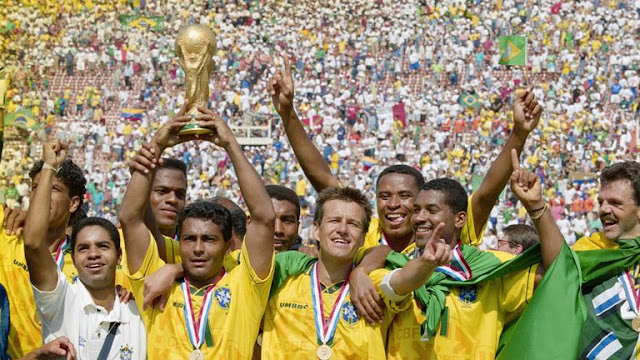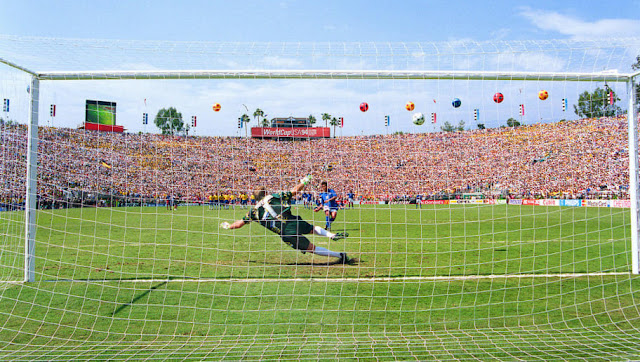Review
Brazil defeated Italy in a penalty competition to win World Cup 1994 after a final goal-less through normal and extra time. Sándor Puhl from Hungary was appointed to referee the final, a choice that remains very controversial and contested to this day. For fairness' sake, an analysis of whether Puhl deserved to be appointed to the final will be separate from an analysis of his performance in it.
You can find an analysis of the officiating in the final by clicking here.
 |
| Korean linesman Park Hae-yong and Diego Maradona Only one would survive the group stage |
Preface
After the fifty-one matches played, there was little doubt that Brazil had been the best team of the competition. Much surer in defence than in previous tournaments, that point was emphasised by their three tight one-goal victories in the proceeding knockout rounds, with the United States, the Netherlands and Sweden all offering them different sort of tests, all of which they came through as deserved winners. Exciting attacking play of star player Romário and others such as Bebeto promised a lot in the final match.
If Brazil had been the best team until now, there is doubt that the most heroic team of the tournament has been Italy. Down and out against Nigeria and in huge trouble against Spain, Roberto Baggio displayed excellent technique and remarkable calmness of thought to score expert finishes to save his nation. Italy fell to Argentina in the semifinals of their own World Cup at the last attempt, but Baggio struck earlier against Bulgaria, and Italy now at a shot at becoming world champions.
The stage was set for a final which most commentators agreed could be a classic.
 |
| Hosts United States were perceived to have done well Both on and off the field |
Referees
Even outside of refereeing circles, the way the games were officiated at World Cup 1994 gained a lot of attention. Officials were threatened "follow the FIFA guidelines or you will be on the first plane home!". As a Brit, being exposed to the media here, it is fair to say that journalists were not particularly enamoured by the style of officiating, while conversely they were very happy to pay homage to what an exciting tournament it was, wondering why the officials had been so strict with teams playing in a manner considered to be much fairer than 1990.
It is true it was rather amusingly lost on those here that the two might just be correlated, but in a way that touches on the problem of how the refereeing was assessed by FIFA at this World Cup. The quality of the officiating was judged on how exciting the games were at the tournament, and not how well each referee handled his matches. In a way, the tournament that was the total juxtaposition of 2014, was really it's doppelgänger.
Ostensibly, FIFA's apparent zero tolerance was more important than the nuances of the reality - though they have a lot to thank Peter Mikkelsen and especially Arturo Brizio Carter for their handlings of the opening day games (both featuring very courageous red cards), which really set the tone for the competition.
The most clear and unambiguous directive of the tournament was - deliberate fouls from behind must be punished with a red card! Not one such ejection actually occurred! Straight reds were shown for:
Actually only one deliberate, non-ball orientated, foul from behind with excessive force happened in the whole tournament; FIFA's word proved to be more prescient than their actions needed to be. And you won't believe who the referee was that didn't issue a red card...
 |
| Arturo Brizio Carter sending off Marco Echeverry This was the first of three reds shown by the Mexican |
Final appointment
That tackle was committed in the Norway - Mexico game, refereed by Sándor Puhl from Hungary. Contrary to tournament directives, he only issued a caution. Despite harsh rhetoric from FIFA, Puhl was not sent "on the first plane home", and his style - which was, whatever you think of it, an affront to the kind of refereeing FIFA had publicly asked for - continued to be in favour.
So much so, that Puhl after his three matches was in contention to referee the final itself! His opponent was the pre-tournament favourite, Peter Mikkelsen from Denmark.
Neither was belonged to the strictest referees at the tournament - Puhl's extreme football-focused style was amongst the most lenient of all, and Mikkelsen's classic but quite elegant background-style saw him issue fewer cards than a fair amount of his colleagues. Between them, they had handled the two legs of the Australia - Argentina playoff; besides Brizio Carter, these were FIFA's top men.
Puhl just about survived the Norway - Mexico game, before offering the most anonymous refereeing performance of the tournament in the Brazil - Sweden group match (definitely a complement at a FIFA niveau). He was rewarded with the Italy - Spain quarterfinal, which in my opinion he totally failed in and even if you disagree, the missed striking incident and ensuing chaos at the end should have ruled him out from future appointments.
Mikkelsen did not have the best tournament either: missed a violent conduct in Spain - Korea, and at the end of Switzerland - Colombia's first half was pretty lucky to still be in control. However, his aesthetic style on the whole succeeded in those games, as well as his knockout stage Netherlands - Ireland tie. Dane was FIFA General Secretary Sepp Blatter's choice for the final, and out from the semifinal appointments, was seen as a clear favourite.
 |
| IFFHS's three best football referees globally in 1991 Puhl (left) and Mikkelsen (centre) side-by-side |
FIFA Politics
In theory, the two most important people in FIFA refereeing at World Cup 1994 should have been David Will, chairman of the referees committee, and Paolo Casarin, WC 1982 attendee and director of the refereeing operation for the tournament. Of course in practice this was very different. Will was a close associate of Sepp Blatter; the Swiss could essentially exercise his will (no pun intended) through the Scotsman; Casarin was seen to represent refereeing's pure interests and was said to be throughly disheartened by the politics he experienced in his role at the tournament.
When it came to the meeting on the Friday morning to determine who would handle the Sunday final, Will, Casarin and Belgian Alexis Ponnet agreed - it should be Mikkelsen. In so far as I can read, Puhl was only really kept as a reserve in case Sweden upset Brazil in the semifinal, in which case a Danish referee would be untenable.
Twenty years FIFA President and staunch Brazil acolyte João Havelange should not have been in that meeting, Blatter wasn't, but all-powerful Havelange insisted he would be there. Havelange managed to persuade the committee to change their mind - Puhl's extreme leniency had won out, and the Hungarian was appointed to handle the final. Havelange is said by one source to have argued for Puhl because he "knew and trusted him better", and concocted the nonsensical argument that Mikkelsen would favour Italy, but Puhl wouldn't.
It would be easy to write that FIFA always, in the end, want referees who simply lack courage, but that's a bit reductionist if you ask me. More - it shows their view of refereeing is totally unideological and pragmatic.
Puhl in 1994 and Archundia in 2006 yes, but we shouldn't forget Torres Cadena in this tournament, Ramos Rizo getting the most sonorous match in 2002, and in 2014 both Carlos Vera (denied a quarterfinal only by the Dutch lobby) as well as Marco Rodríguez whose SFP call in Italy - Uruguay (of course, excellent in my view) somehow earned him a semifinal. Say as I do, not do as I say!
Though I would still argue that especially concerning finals but also FIFA refereeing more widely, one performance in a final (about which there is lots to say!) by a man who certainly had guts haunts and informs them to this day! Puhl probably benefitted a lot from that, as well as the scarring Al-Sharif experience in this round of sixteen.
 |
| A good man - Edgardo Codesal (centre) |
It is testament to Peter Mikkelsen's good grace that he kept to his promise of having dinner with Puhl that Friday evening. We lost a great man last year, both on and off the pitch, and for what it matters - he will always be my final referee. One of the most inspirational ever and without doubt, taken way too early. Rest in peace, Peter Mikkelsen (1960 - 2019).
It should be said that criticism of Puhl's performances were not universal, in the British media, he was praised for his handling of the Italy - Spain game, if not what happened at the end. There certainly were enthusiasts for his style, FIFA President Havelange included. What came before now mattered not - Puhl was focused on doing the best job possible as the fifteenth World Cup final referee.
Joining Puhl were linesmen Venancio Zárate from Paraguay and Mohammad Fanaei from Iran; fourth official Francisco Lamolina completed the appointment.
Zárate had performed consistently at a high level in his five games. Paraguayan had correctly perceived highly important situations in both his knockout games - to allow Nigeria's goal against Italy, and most importantly to disallow a second Germany goal in their quarterfinal against Bulgaria. Especially the latter call probably confirmed Zárate to be the Americas representative in the final.
Fanaei was very lucky not to be removed after his first match - he made a very poor mistake to disallow a Switzerland goal against Romania. Man from Iran having survived the group stage performed well in two knockout stage games where he was fairly quiet (MEXBUL - NEDBRA).
I wonder if Yousif Al-Ghattan from Bahrain was actually planned for the final. His compatriot Jassim Mandi reached the quarterfinals in 1990 and was even reserve referee for a semifinal, so Bahrain certainly had a significant lobby at a FIFA level. Maybe the correct passive offside decision in the Netherlands - Brazil game hurt Al-Ghattan's chances, and it was decided to appoint Fanaei instead from AFC.
Francisco Lamolina's (lack of knockout stage) appointments belie his estimation by FIFA, and his appointment as fourth official to both the semifinal he was removed from and the final itself, are compensation for being unlucky.
 |
| On top of the world! (from L-R) pink-shirted Mohammad Fanaei, Francisco Lamolina, Sándor Puhl and Venancio Zárate lead the teams out for the World Cup 1994 Final |



Comments
Post a Comment